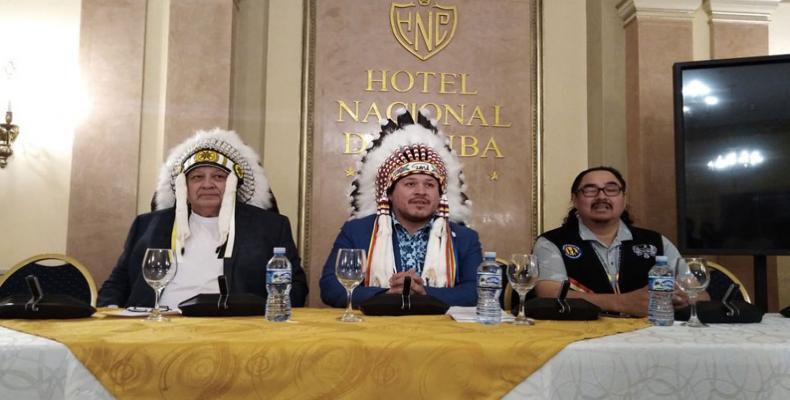First Nations leaders and health technicians from Manitoba and Alberta in Canada have expressed their communities’ interest in establishing cooperation links with Cuba in the field of health.
After a week in Havana, where they toured several institutions in the sector and held meetings with authorities in the field, including Cuban Health Minister Dr. José Ángel Portal Miranda, they announced at a press conference over the weekend their growing desire that Cuba be able to provide them with professionals trained in basic health services, who can attend to the needs of the traditionally marginalized First Nations communities in Canada.
Jerry Daniels, the great chief of the southern region of Manitoba, and of the Organization of the Chiefs of the South, which represents 34 of the more than 600 native nations of Canada, said at Hotel Nacional de Cuba that their peoples “have been limited in their access to health care provided by the government,” and that is why they demand health care providers and various services in these communities.
He said that these communities “are in the midst of a process of transformation of care services, aimed particularly at creating and facilitating access, not only in infrastructure, but also in decision-making and the training of professionals.
What we all agree on is that we need many more providers and access to health care, quality services, and professionals to assist these communities, especially the most remote ones,” he remarked.
Chief Daniels underscored that Cuba has a structure in place and is recognized for using it, in addition to having cooperation programs consisting of sending health professionals to various nations, where they do their work with quality and contribute to saving lives even in the most difficult to reach regions.
He added that the Cuban government “can help in two fundamental aspects: sending doctors and other professionals to work in those communities to provide health services, and training specialists at the Latin American School of Medicine to return and cover existing health needs.
“We are pleased to imagine that hundreds of health professionals will come to our communities and heal women, children, the elderly and other vulnerable populations. It would be a truly promising future,” the native leader argued.
According to Daniels, another impact would be that by improving access to health care in these communities, in a more just and professional way, the migration of these populations to the cities in search of these services would be reduced.
“We want our communities to have health posts, hospitals and other assistance centers, and I urge the other chiefs of the first nations to open up to this possibility of collaboration with Cuba, which we need so much,” he said.
He called for accelerating the process of finding solutions to reverse existing health problems in these locations, such as diabetes, cancer, among other factors. “That is why we are here and we call on all world leaders to help us find solutions to provide better, quality health systems,” he summarized.
For Chief Dave Ledoux of the Gambler Pueblo, the offer from Cuba to the native peoples in Canada corresponds to the Cuban health mission around the world since 1959.
The leader highlighted the recognition of the Island’s health system by the WHO, as well as the quality and its preventive and holistic model, which has allowed it to achieve minimal infant mortality rates, and to increase the life expectancy of its population.
“Thousands of students from all over the world have come to Cuba to study the different medical specialties in the last 60 years,” he pondered, and emphasized that it would be an opportune moment for this offer of help, “since we are currently rebuilding our communities to get out of decades of systemic institutional oppression.
“The health philosophy of this country (Cuba) and its values are very similar to the traditional medicine model of our peoples,” said Deloux.
“The more than 600 first nations in Canada include more than one million people who would benefit from these services,” he said. He added that from these initial meetings in Havana they are optimistic and hope to apply the ideas, designs and organizational strategies observed in the Cuban health system.
source: CubaNews


